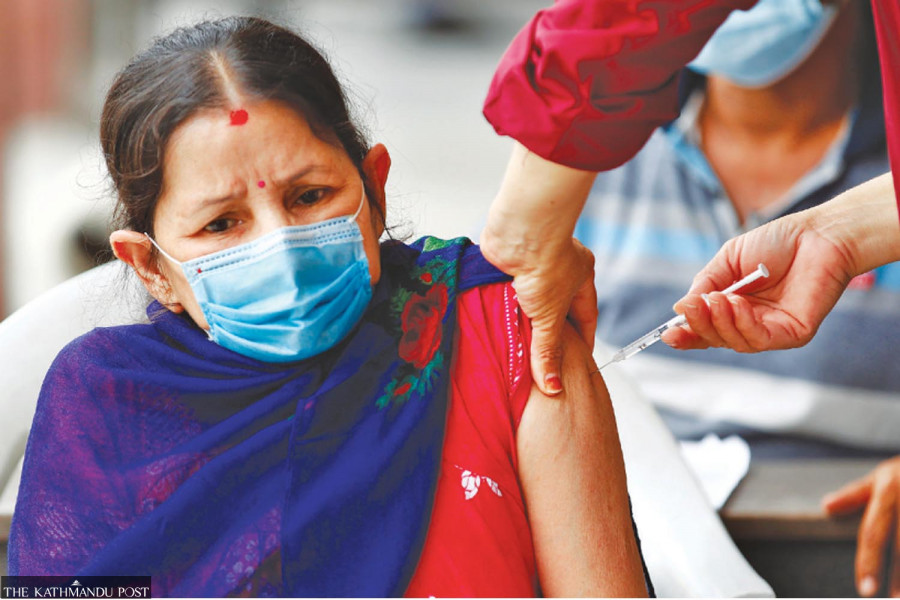
Four million doses of Sinovac-CoronaVac Covid-19 vaccine doses supplied by China some 10 months ago may not be rolled out ever, since the uptake of booster shots in Nepal is dismal.
Officials at the Ministry of Health and Population said that another reason why the rollout of the vaccine doses supplied by the northern neighbour is the assurance of updated bivalent vaccine doses by COVAX, the United Nations-backed international vaccine sharing scheme.
“We have proposed the rollout of Sinovac-CoronaVac jabs at a meeting of the National Immunisation Advisory Committee, four times,” an official at the Health Ministry told the Post, asking not to be named as he is not authorised to speak to the media. “But the meeting could not take a decision in this regard.”
China supplied four million doses of Sinovac-CoronaVac jabs in March under a grant assistance. The government sent planes specifically to bring the vaccines from China.
The doses have a shelf life of two years, so the health authorities decided to use another vaccine with a shorter life.
Public health experts, however, at the time had advised the authorities that it would be unwise to keep the vaccine doses manufactured months ago in stock for long, as Covid variants are mutating fast and the pharmaceutical companies have been working to redesign their vaccines.
Officials say experts from the National Immunisation Advisory Committee are of the view that the vaccine can be used as primary doses—first and second—but are reluctant to use them as third or booster shots.
“We have requested the local governments to see if the Sinovac-CoronaVac vaccine could be used as primary doses,” said Dr Bibek Kumar Lal, director at the Family Welfare Division. “But representatives from most local units say they do not have people who have not taken any vaccine dose.”
Health Ministry officials claimed the Sinovac-CoronaVac vaccine has not got recommendations from credible organisations for use as a booster.
However, the World Health Organisation’s Strategic Advisory Group of Experts on Immunisation (SAGE) has recommended a third additional dose of the Sinovac-CoronaVac vaccine be offered to persons aged 60 and above as part of the extension of the primary series.
The SAGE accepts two heterologous doses of WHO EUL (emergency use listing) Covid-19 vaccines as a complete primary series.
“Either heterologous [a different vaccine product to Sinovac] or homologous [a booster dose of Sinovac] doses could be used,” reads the SAGE decision. “Studies in Chile and Brazil found that heterologous boosting resulted in superior and more robust immune responses than homologous boosting.”
Nepal bought millions of doses of Vero Cell and received on grant Sinovac-CoronaVac vaccines, both manufactured in China.
Of the total Vero Cell vaccine doses Nepal got, the government purchased 10 million doses through a non-disclosure agreement from the manufacturer, Sinopharm. The consignments arrived on various dates. An additional 5,936,400 doses were bought through COVAX’s cost-sharing scheme.
China has donated 3.8 million doses of Vero Cell to Nepal so far.
The Vero Cell vaccine is credited with saving lives in Nepal at the time of the Delta variant, which brought a second wave of the pandemic in the country.
Officials at the Health Ministry concede that all four million doses of the Sinovac-CoronaVac vaccine may have to be discarded as the chances of its use are slim.
“The government purchases several medicines every year, which don’t come into use and which have to be discarded after expiry,” said an official at the Department of Health Services, seeking anonymity. “Despite knowing that it may not come into use, we have to purchase such medicines to maintain stock, for possible emergency situations. We have to discard these vaccine doses too.”
Public health experts say that even if the number of new cases of Covid-19 has declined significantly, the possibility of another surge cannot be ruled out.
“Uptake of booster shots is very low in our country, which is not a good thing,” said Dr Rajiv Shrestha, an infectious disease expert at Dhulikhel Hospital. “The authorities must do everything to boost the coverage rate of the third vaccine dose.”
Experts have long been stressing the need for increased vaccination coverage, with the vaccine being the only reliable medium to prevent severity and deaths from infections. They suggest that authorities should do micro-level planning, and launch awareness and door-to-door campaigns to increase vaccine coverage.
The Health Ministry said as many as 7,972,791 people, or around 27.3 percent of the total population, have taken booster shots so far. The government started rolling out the shots some 10 months ago.
As many as 22,324,933 people (76.5 percent of the total population) have been fully vaccinated as of Monday, according to the Ministry of Health and Population.












